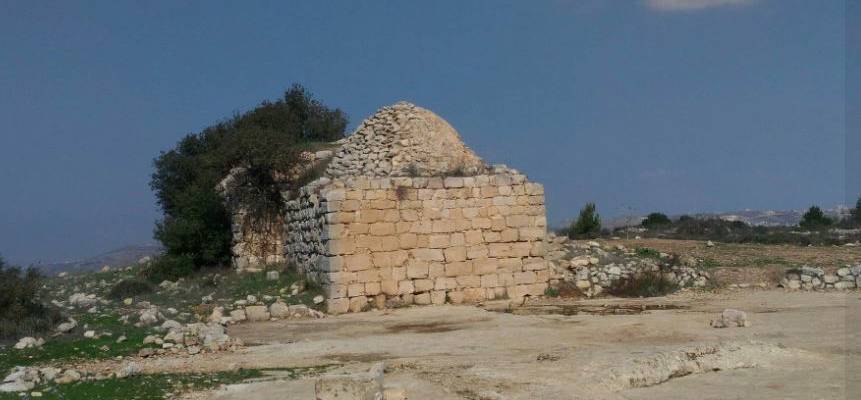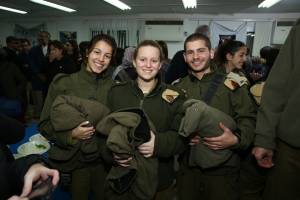Although one of the most climatic and consequential events in the Bible took place here, few tourists ever visit.
By Nosson Shulman, Licensed Tour Guide
Although one of the most climatic and consequential events in the Bible took place here, few tourists ever visit. You shall soon see, however, why this site is not to be missed!
Beit El is initially mentioned when Abraham and his household first entered the land of Israel. G-d had told him to leave his homeland and go to the land “which I will show you (Genesis 12:1).”
After arriving in Israel from Haran (part of modern day Turkey) he journeyed southwards, eventually arriving in Beit El, where he pitched his tent temporarily and set up an altar to Hashem (G-d) and invoked Hashem by name (Genesis 12-8).

Jacob fled from Beer Sheva (in green circle) taking the road (red line) to Beit El (in Blue Circle) Credit: https://www.thebiblejourney.org/
Eventually, Abraham traveled further south, ultimately settling in Beer Sheva (often spelled Beersheba). Two generations later, Abraham’s grandson Jacob fled Beersheba (click here to see article) to get away from his murderous brother Esau, returning to Haran to find a wife. (Rebecca did not want her son to marry a local Canaanite, so his father Isaac instructed him to return to Haran to get married.) On the way, the sun set when Jacob had arrived to Beit El, so he spent the night there out in the open.
Why does the Bible make a specific mention of the sun setting (Genesis 28:10)? According to Jewish sources, Jacob was praying there to G-d when he heard Angels having a discussion. Jacob then realized that he was standing in a very holy site connected with heaven. However, with a long journey ahead of him and several hours left in the day, he was about to leave when G-d caused the sun to set early, so Jacob would spend the night there and G-d would reveal Himself in a dream (the spot was especially conducive to higher levels of prophesies).
Jacob then took stones from the site, placing them around himself for protection from wild animals. According to Jewish sources, it was exactly 12 stones, representing the 12 sons he would have who would make up the tribes of Israel. While he slept, the stones combined into one big stone (the one he was using as a pillow), which signified that all 12 of his sons would be righteous and follow in his ways.
Later, a Canaanite city state emerged at Beit El with its own King. Joshua and his army defeated them upon entering Israel, and the land fell within the territory of the tribe of Ephraim.
Hundreds of years later, after King Solomon died, the Kingdom split in two and Beit El found itself in the northern Kingdom of Israel.
The Kingdom of Israel was to be ruled by the (initially) righteous Jeroboam with his capital in Samaria, while the southern Kingdom continued to be ruled by Solomon’s son Rehoboam with Jerusalem as its capital.
Unfortunately, power quickly got to Jeroboam’s head, and he made some fateful decisions.
When the Temple stands, all Jews are obliged to travel to Jerusalem at least three times a year: Passover, Shavuot, and Sukkot. Jeroboam was worried that when his subjects (all of whom were Jewish) would go to Jerusalem, their hearts would turn towards the ruler of Judah, and they would begin to see him as only a secondary king and eventually overthrow him. He therefore decided to set up new places of worships, complete with Golden calves, in Beit El and Dan (1 Kings 12:28-29). He even made up his own holidays and declared himself a priest, burning incense to the calves in Beit El.
Ultimately, these misguided fears brought the Kingdom of Israel to spiritual ruin. This, according to Jewish sources, is the reason the northern Kingdom was exiled 133 years earlier than the more righteous southern kingdom of Judah. Ultimately, his descendants continued in his wicked ways and were eradicated from the face of the earth (1 Kings 13:33-34),with Jeroboam having no portion in the World to Come.
A few hundred years later, the righteous King Josiah of Judah destroyed this “High place” of Beit-El (2 Kings 23:15). Soon after, Babylonia conquered Israel and destroyed Beit El.
The Persians who conquered the Babylonian empire 70 years later rebuilt Beit El, and when the Greek forces of Alexander the Great conquered the land from them in 332 BCE, the city continued to grow.
In the second century BCE, when the Hellenists (Greek) forces fought the famous Jewish rebels known as the Maccabees, they fortified the city, though ultimately the Maccabees were successful and expelled the Greeks from Israel, thus re-establishing Jewish sovereignty for the next 80 years in all of Israel (The Jewish holiday of Chanukah is connected to these events).
In the 1100s, the Crusaders built a chapel on this site.
When the Muslims expelled the Crusaders, they built a mosque here as well
Between 1948-67 Jordan controlled this land, and when Israel liberated Judea and Samaria (West Bank) ,they re-established a Jewish settlement here. Today, the population is about 6200, with many new houses being built.
Today, Beit El has much to offer to tourists of all ages! On your next trip, let us plan on visiting this treasure together!
Nosson Shulman is a journalist and Licensed Tour Guide in Israel specializing in Biblical tours. To allow tourists to experience Israel during the Corona era, he created the new hit Israel tour video series which brings Israel to the home of viewers by simulating actual tours. To check out his free sneak preview tour videos, click here. To view sample tour itineraries or to inquire about private tour opportunities with a personalized itinerary on your next trip to Israel, click here.
Bring Joy to Israeli Soldiers - Send Winter Care Packages!
We are honored to thank the young men and women of the IDF who risk their lives every day to defend the citizens of Israel.
Join us in sending winter care packages and personal notes of support to Israeli soldiers who are out in the cold all day.
Warm up a soldier's heart with essential winter wear including fleece jackets, hats, gloves and more. Keep an entire unit warm!
THE SOLDIERS REALLY APPRECIATE YOUR LOVE AND CONCERN!
Click Here to Send Your Gift and Personal Note to Israeli Soldiers

